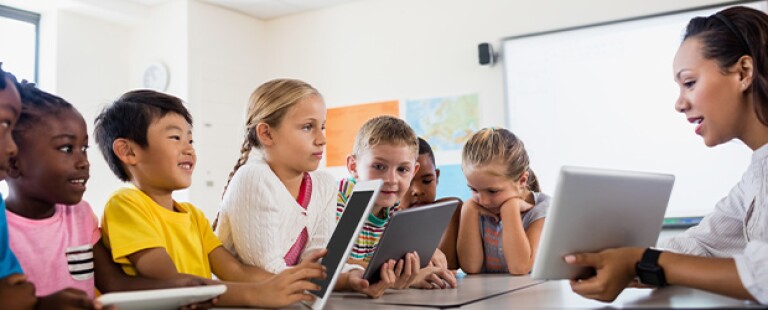Discover the Essential Benefits of Comprehending Main Science for Young Students
The relevance of key science education and learning for young students expands much beyond plain expertise procurement; it offers as a basic column in creating crucial abilities such as critical thinking, analytic, and imagination. Engaging with scientific ideas with inquiry-based and interactive tasks not only grows curiosity but additionally lays the groundwork for durable, confident learners.
Enhancing Crucial Believing Skills
Cultivating vital assuming skills in young students is vital for their cognitive development and future academic success. Critical reasoning enables children to analyze info, evaluate proof, and make notified choices, which are important skills in today's information-rich society. By engaging in clinical query, young learners can enhance these abilities as they explore principles through monitoring, experimentation, and thinking.
In key science education, instructors can assist in essential reasoning by urging students to ask inquiries, create theories, and carry out experiments. This hands-on method allows kids to exercise problem-solving and establish logical thinking abilities. As an example, when students explore the properties of products or the principles of movement, they find out to evaluate their findings seriously and draw final thoughts based upon evidence.
In addition, discussions and collaborative jobs can promote vital thinking by giving possibilities for learners to express their ideas, obstacle presumptions, and take into consideration varied point of views. By developing a helpful atmosphere that values questions and representation, educators can support crucial believing abilities that empower young learners to come to be long-lasting students and independent thinkers. Ultimately, enhancing these skills lays a durable structure for their future academic ventures and individual development.
Fostering Curiosity and Expedition

Main scientific research education provides an organized atmosphere where young students can discover various phenomena via hands-on experiments and monitorings. By allowing them to engage with products and take part in inquiry-based discovering, educators create chances for youngsters to formulate theories, examine their ideas, and attract conclusions. Such experiences support a sense of wonder and exhilaration about science.

Building Self-confidence in Problem Addressing
Building self-confidence in analytic is a critical component of key science education and learning that equips young learners to approach difficulties with strength and creativity - primary science tuition Singapore. When kids are urged to involve with scientific concepts with hands-on tasks and inquiry-based learning, they develop necessary abilities in vital reasoning and evaluation. This process not only enhances their understanding of clinical principles however likewise fosters a feeling of ownership over their learning
To construct self-confidence, teachers need to develop a helpful environment where mistakes are considered as opportunities for development as opposed to failures. This encourages students to take risks and check out different options to troubles. By offering scaffolding and guidance, educators can help students browse intricate jobs, progressively raising their freedom in problem-solving circumstances.
Furthermore, collective knowing experiences, such as team tasks or experiments, can further enhance trainees' confidence as they find out to articulate their thoughts and pay attention to others' point of views. These communications support social skills and reinforce the concept that analytical is frequently a collective venture. Eventually, cultivating self-confidence in problem-solving prepares young learners for future academic challenges and equips them with the devices required for lifelong understanding.
Encouraging Creative Thinking and Innovation
In the world of primary science education, encouraging creativity and technology is necessary for cultivating a vibrant discovering environment. By fostering a society where young students can discover ideas and experiment openly, educators help trainees create crucial assuming skills and an enthusiasm for exploration. Creativity in scientific research encourages youngsters to ask inquiries, develop theories, and participate in hands-on tasks that stimulate their imagination.
Incorporating open-ended projects and inquiry-based learning right into the educational program permits students to express their special viewpoints and solutions. As an example, when entrusted with resolving an issue pertaining to their atmosphere, pupils can brainstorm several techniques, resulting in inventive outcomes that display their creativity. This not just deepens their understanding of clinical concepts but also imparts a sense of ownership over their learning procedure.
In addition, creative scientific research education and learning supports cooperation among peers, as trainees typically share concepts and improve each other's insights - primary science tuition Singapore. This joint spirit promotes not only innovation but additionally important social abilities. Thus, by prioritizing creativity and innovation in primary science education, we equip young students to think critically, embrace obstacles, and visualize possibilities, laying a solid foundation for lifelong discovering and expedition
Getting Ready For Future Understanding Obstacles
Young students' ability to navigate future learning challenges depends upon a strong structure in main science education and learning. This fundamental understanding Find Out More furnishes pupils with essential assuming abilities and an organized approach to problem-solving, necessary for dealing with intricate problems in an ever-evolving globe. Primary scientific research fosters inquiry-based knowing, urging students to ask questions, discover theories, and involve in hands-on experiments.
As they develop these skills, learners come to be adept at assessing data, identifying patterns, and drawing educated final thoughts. Such proficiencies are essential not just in scientific fields however also in math, innovation, and engineering (STEM), where interdisciplinary expertise is increasingly important.
Furthermore, primary scientific research education cultivates a feeling of curiosity and resilience in young students, allowing them to see challenges as chances for growth. As they run into and get over barriers in their clinical expeditions, they build self-confidence in their ability to innovate and adapt.
Ultimately, a solid foundation in key science not just prepares young learners for scholastic pursuits however additionally equips them with the devices needed for lifelong knowing and flexibility in a quickly transforming global landscape. By buying key science education and learning, we are purchasing the future possibility of our learners.
Conclusion
Recognizing primary science is essential for young learners, as it promotes vital thinking, interest, and imagination. Engaging with scientific concepts via hands-on experiments enhances problem-solving capacities and develops resilience. This foundational understanding not just equips pupils to evaluate data and identify patterns but likewise nurtures an inquiry-based state of mind. Ultimately, the benefits of main scientific research education prepare children for future scholastic quests and impart lifelong learning behaviors essential for growing in an ever-evolving globe.
The significance of primary science education for young learners prolongs much past simple knowledge purchase; it serves as a fundamental column in creating crucial abilities such as vital thinking, analytical, and imagination. By producing a supportive atmosphere that values query and reflection, educators can support critical thinking skills that encourage young students to come to be independent thinkers and lifelong students. Thus, by focusing on imagination and development in main science education, we encourage young students to believe seriously, accept obstacles, and envision possibilities, laying a strong foundation for lifelong learning and anchor exploration.
Young learners' capacity to browse future discovering challenges pivots on a solid structure in key science education.Recognizing key scientific have a peek at this website research is crucial for young students, as it promotes critical reasoning, inquisitiveness, and creativity.
Comments on “Boost Your Child’s Confidence with Primary Science Tuition Singapore”